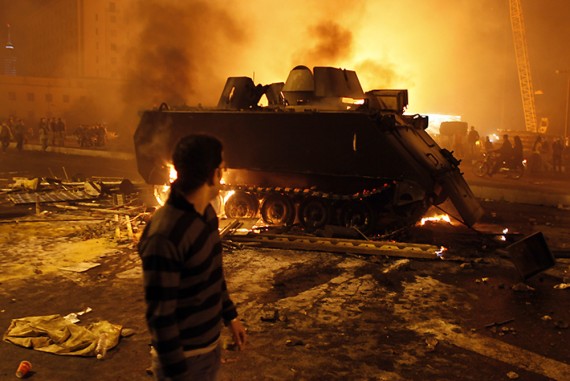Mohammed El-Baradei: Mubarak Must Go, U.S. Is Disappointing Egyptians
Mohammed el-Baradai had harsh words for Hosni Mubarak and the United States when he spoke today from house arrest.
He may be under house arrest, but former United Nations weapons inspector Mohamed el-Baradei, who has become something of a rallying point for the Egyptian protesters, is still speaking out, and he has harsh words for Hosni Mubarak and the Untied States:
Egyptian dissident Mohamed ElBaradei called the U.S. position on the Egyptian crisis a disappointment and condemned Egyptian President Hosni Mubarak’s early Satruday morning speech as “almost an insult to the intelligence of the Egyptian people.”
ElBaradei also said in an interview with the English-language segment of France 24 that he would continue to speak out against Mubarak’s regime, whether he was under house arrest or not, until the president leaves office.
(…)
ElBaradei said Egyptians had hoped that Mubarak would have announced his resignation earlier on Saturday, “but at the last minute he came out with an empty statement which was a huge disappointment to the Egyptian people.”
Mubarak, he said, doesn’t have a clue.
“He obviously did not understand the message from the Egyptian people,” ElBaradei said. “It was almost an insult to the intelligence of the Egyptian people to tell them that the only response is that I will have a new government. People know full well that he is in charge of every aspect of running the country. He did not elaborate on one single economic or social reform.”
Given the reaction of the Egyptian people today to the changes in government that Mubarak has made, El-Baradei would seem to be 100% correct on this point:
In Alexandria, where some of bloodiest clashes with the police took place, protesters’ positions appeared to be hardening, with at least some expressing anger at the United States.
“I’ve been in the streets from the 25th on, and I’m going to remain in the streets until Hosni Mubarak and his friends leave the country,” said Marwat Saleh, 43, who owns a small tourism company.
“It would have been better if he had not given his speech yesterday, because it seems he did not understand our demands,” she said. “We want him to step down, not only the government; he has to go.”
Mr. Mubarak’s speech just after midnight, in which he dismissed his cabinet, was mainly a defense of his government and the imperative to maintain stability.
Protesters in the city also voiced significant anger at the United States, rushing up to American reporters on the streets unprompted to ask why the United States continued to back the Egyptian government.
“We are very disillusioned by President Obama’s speech,” said Muhammad Shafai, 35, a lawyer, who called for Mr. Obama to distance himself from Mr. Mubarak.
El-Baradei echoed this sentiment in his interview:
“What is … very disappointing to the Egyptian people is the message coming from the U.S., which is saying that we are going to work with the Egyptian people and with the government,” he said. “Well, you have to make a choice. This is an authoritarian government and on the other hand the people have been deprived of their freedom for 58 years.”
As James Joyner noted this morning, the United States is in a difficult position. I don’t think there are any clear answers here, and little ground to criticize the Obama Administrations response to what is clearly the most difficult foreign policy crisis they’ve dealt with to date. However, it’s worth noting that we may be nearing a point where U.S. influence over Mubarak is not nearly as strong as we thought it might be and that it’s time to start considering what the Egyptian people will think of how we’ve acted here when the government finally does change.
Photo via Al-Jazeera





![Military Coup Underway In Egypt [Update: Morsi Deposed]](https://otb.cachefly.net/wp-content/uploads/2011/02/egypt-flag3-512x256.gif)

“… it’s time to start considering what the Egyptian people will think of how we’ve acted here when the government finally does change.”
How would you suggest we act?
I would worry that any significant action stands a high chance of backfiring. We’ve propped Mubarak up for decades. The Egyptian people’s anger towards Mubarak is also going to be a resentment towards the US, and we can’t change that overnight. Any actions that we take that can be inferred to be supporting one group of the opposition or another may end up delegitimizing that group.
I think the only thing we can really do at this point is start preparing to deliver and distribute humanitarian aid once Mubarak does fall, and working behind the scenes to find a comfy retirement home for him. I would hope that the Obama administration is doing both.
But, that is nothing that is even going to be noticed while the protests are going on.
50 quatloos on Mubarack.
Gustopher,
As James, Steven, and I have all said today in different ways there isn’t much we can do beyond what we are doing. Personally, I think the ultimately course of events is out of our control
Gustopher,
Nor is it entirely clear to what extent we’ve “propped up” the Mubarak government. This isn’t the shah or Iran, who gained power because we put him in place and kept it only so long as we kept him supplied with arms. Indeed, the precursor regimes we’re supplied with armaments by the Soviets.
It’s true that we’re currently supplying Egypt with billions of dollars annually pursuant to the Camp David accords. But that’s not regime-specific; we’ll do that with a follow-on government that keeps up its end of the bargain.
James,
Isn’t the question not so much how much we’ve “propped up” Mubarak as it is how much the Egyptian people think we’ve propped him up?
Perception is often reality in this siuations
You can parse it any way you want. The bottom line is we are in bed with this guy, and have been for decades. We have supported him, just as we support other dictators in the middle east to maintain the crappy status quo that keeps the oil floating.
We need to keep the oil flowing, because we have adamantly refused to do anything about our dependence on middle eastern oil. Well, what’s more important, the long-term national security interests of our country, or oil company profits? I think we all know the answer to that one. Exxon wins, we lose.
anjin-san,
Egypt has no oil, although admittedly the Suez Canal is a major conduit for tankers and the location of several refineries.
No, the main reason the Egypt has been our “ally” for all these years is to preserve the peace that Begin and Sadat negotiated 33 years ago
> Egypt has no oil
Duh.
No oil, but nonetheless, a major player in the middle east, and a touchstone of the Arab psyche. And yes, the peace that Carter and Begin and Sadat negotiated is a key to the dynamic. but we supported Sadat prior to the Israel/Egypt peace accords because Egypt had been a Soviet client and we wanted them playing on our team.
This process probably started with US funding for the Answan Dam project in the mid 50s and continued with US tilt towards Egypt during the Suez crisis. The combination of Egypt punting Soviet advisors in the early 70s and Arab defeat in the Yom Kippur War gave Nixon & Kissenger a chance to flip Egypt once and for all.
So yes, the Camp David Accords are the lynchpin of our informal alliance with Egypt, but they hardly tell the whole story.
James,
We’ve supplid training to the Egyptian military and police forces for decades, and we’ve also given them technology to enhance their domestic surveillance capabiities. In other words we have improved the Egyptian government’s ability to supress the populace. By any standard we have expended energy to keep Mubarak in power.
So, Anjin, in your unquestioned wisdom. Why don’t you give us the benefit of your vast knowledge on the subject of Egypt? Opinions are like a$$holes, everybody has got one. Yours stinks.
RagingShaft,
He just did. Make yourself useful and try contributing to the discussion by, you know, being specific.
It’s hardly worth mentioning, but there’s a fairly amusing typo in the first sentence of the post. Funny how a transposition of letters can cause a complete reversal of meaning.
Any way Mubarak and el-Baradei can both lose?
$2bill / year according to the budget.
As the Shah of Iran brutally killed, Husni Mubarak is attacking his own people with American bullets and tear gas cannons. “Made in USA” marked on burnt cannons on the streets of Cairo for its people to understand the conspiracy of democracy and controlling violence.
It is not surprising why there is so much anti-American sentiment across the world and more so in the Muslim world. This is another case study of U.S. foreign policy of aiding arms and financing a dictator for decades and ending up on the wrong side of history.
At least now the U.S. government and the people should stop hoping for Mubarak to hang-on. Many may wonder which military strongman that the CIA is going to recommend to replace Mubaruk.
Husni Mubaruk has chosen a man he can trust while the people are trying to chase him away. But Mr. Suleiman, a former general, is also the Mubaruk’s candidate, not the one that the people of Egypt will approve.
His appointment if it were to occur would not represent the democratic change called for on the street, but most likely a continuation of the kind of military-backed, oppressive, corrupt, authoritarian and pro-Israeli, pro-American leadership that Mr. Mubaruk has led for nearly 30 years. Basically this is a way of paving the way for a military-led regime under the guise of reforms and democracy, a good move to please the U.S. neo-cons.
After all, Suleiman is said to hold a similar worldview, deeply distrusting Iran, favouring close relations with Washington, supporting the cold peace with Israel, and against easing up on the Muslim Brotherhood, the principal opposition group in Egypt.
So far Obama has played this just right. For the moment the smart play is to keep a door open with Mubarak so that we can help him step down and make a peaceful transition.
But if Mubarak goes Tienanmen Square on this, that’s over. At that point we say, it’s time to go Hosni, your aid just stopped and it won’t resume til we see a new government.
Hopefully it won’t go that far.
> why is it you think it is OK for Obama and the Democrats to waste two years crafting Obamacare, failing to address the economy?
Guess Fox has not told these guys the GDP is now back to where it was before the economy went Chernobyl under Bush…